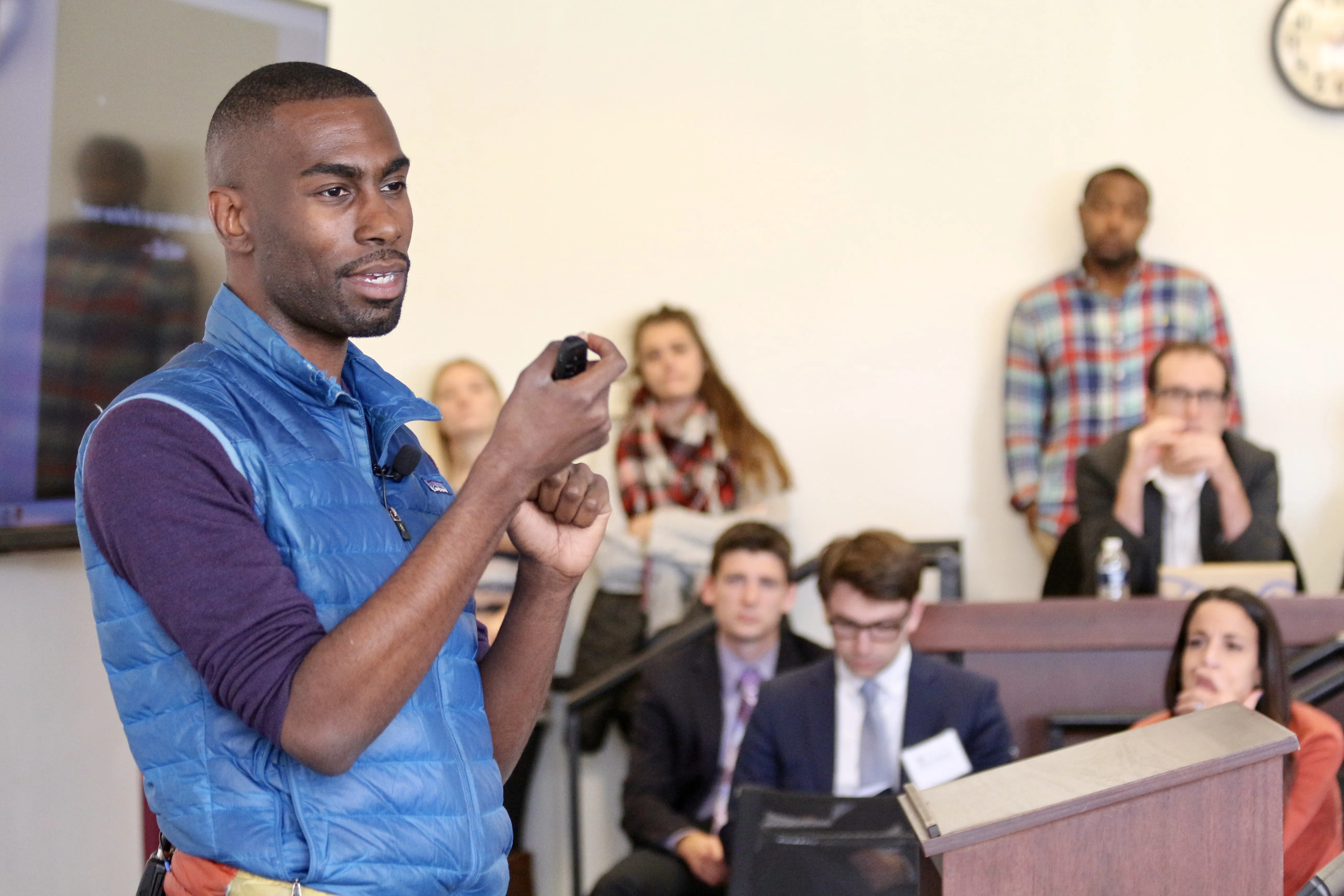Getting to the Other Side of Freedom

When Black Lives Matter activist DeRay Mckesson spoke at the Law School earlier this month, he challenged students to fight the mindset that has long obstructed low-income communities of color. During the talk, which provided a roadmap for overcoming this mindset, Mckesson, a former teacher and school administrator, recalled a story about students in his sixth-grade math class. One day, they asked to leave his class so they could go to gym early, but then returned to his classroom after just five minutes.
“I realized that they were more in love with the idea of gym than with the work of gym,” Mckesson said. “And it makes me think that people are more in love with the idea of resistance than the work of resistance. I’m trying to figure out how we help people understand the work better.”
Mckesson’s speech, “The Other Side of Freedom”, was the keynote address for this year’s University of Chicago Legal Forum symposium, “Law and Urban Institutions Ten Years after The Wire.” Using the popular television series The Wire as a lens to study the role of law in the systems that govern urban centers, the symposium covered topics ranging from police brutality to drug decriminalization to changing the narrative of the criminal justice system. Mckesson, who grew up in Baltimore, began his keynote by outlining this side of freedom—one that continues to struggle with police accountability and implicit bias. After shedding light on police violence through research conducted by Campaign Zero, Mckesson discussed some of the obstacles in organizing around them, including that many are unaware of these concerns in the first place.
“I never ever take for granted that people know the issues,” Mckesson said. “I think about the beginning of the protesting in St. Louis, and how people thought there was a crisis in Ferguson, but didn’t think there was a crisis in America. It took a really long time to convince people that this was an issue everywhere.”
Much like The Wire, Mckesson established connections between the different social problems facing urban centers today—the focus on policing has had a huge impact, but issues like the opioid crisis and the often unchecked power of prison wardens need attention as well. One of the biggest barriers to addressing them, he said, is a sense of feeling overwhelmed by their magnitude and the corresponding negative mindset that can prevent people from taking action.
“Some people have made pessimism cool,” Mckesson said. “There are people who are really enamored with critique, so critique has become this prized possession. But part of this work has to be about offering solutions—that we critique and we try to understand so that we can think about how to fix this in a way that will actually make sense.”
Throughout the keynote, Mckesson referenced the problems he tackled working as a public school administrator. At the Baltimore City Public Schools, he determined the most efficient way to distribute paper paychecks to teachers, and challenged a system that had been in place for many years. The experience demonstrated the difference between leading and managing, and this distinction applies to the causes he organizes around today. As a human resources official at Minneapolis Public Schools, Mckesson was in charge of hiring new teachers. One of the questions they asked during interviews was: “Do you think that kids from high-need communities can achieve the same standards as kids from wealthier communities?” He was shocked that there were candidates who said they couldn’t—this type of mindset, he added, can be one of the most difficult things to change.
“It was fascinating, because we were trying to figure out the mindset issue,” Mckesson said. “We believe that we can teach you classroom management, we can teach you the content, but I can’t teach you to believe that poor kids can learn. Either you believe that poor kids can learn, or you don’t.”
The work of resistance, Mckesson said toward the end of the talk, must center just as much on the quieter traumas as on the loud ones. A tax bill recently proposed by Congress may not be at the front of people’s minds, he said, but it could decrease revenue without cutting spending and ultimately end programs like Head Start and the Supplemental Nutrition Assistance Program, also known as food stamps.
“With the police, there are so many people organizing around that right now,” Mckesson said. “That’s important, and the energy is there, but the scaled solutions and helping people understand that there is another set of issues that we have to get around—that has to be a part of the work, too.”